In Final Days Before Vote, Divided Electorate Expresses Anxiety and Concern
ADAM NAGOURNEY and JANET ELDER, New York Times, November 1, 2004
The nation is girding for tomorrow's presidential election, worried about the integrity of the voting system, divided over the legitimacy of President Bush's election four years ago and anxious about the future no matter who wins the contest, according to the final New York Times/CBS News Poll of the 2004 campaign.
A majority of voters - and an overwhelming number of African-Americans - said they were concerned that their own votes would not be counted properly, and one-third said they expected to encounter problems when they went to vote, the poll found. Nearly 80 percent of black respondents said they expected that some states would make a deliberate effort to prevent them from voting tomorrow.
...[...more]
Yasser Arafat's unrelenting journey
By Barbara Plett, BBC correspondent, West Bank, October 30, 2004
The world watches the unfolding drama as the man who has become the symbol for Palestinian nationalism seems to hover between life and death. Though full of uncertainties, Mr Arafat's life has been one of sheer dedication and resilience.
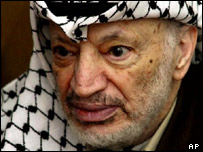 Profile: Yasser Arafat
Profile: Yasser Arafat
To be honest, the coverage of Yasser Arafat's illness and departure from Palestine was a real grind. I churned out one report after the other, without any sense of drama.
Foreign journalists seemed much more excited about Mr Arafat's fate than anyone in Ramallah.
We hovered around the gate to his compound, swarming around the Palestinian officials who drove by, poking our microphones through their dark, half-open windows.
But where were the people, I wondered, the mass demonstrations of solidarity, the frantic expressions of concern?
Was this another story we Western journalists were getting wrong, bombarding the world with news of what we think is an historic event, while the locals get on with their lives?
Yet when the helicopter carrying the frail old man rose above his ruined compound, I started to cry... without warning.
In quieter moments since I have asked myself, why the sudden surge of emotion?
Waves of emotion
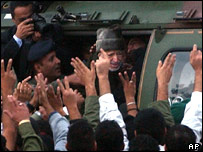
The helicopter took Yasser Arafat to Jordan to change aircraft
I suppose there was a pathos about the strong contrast between this and other journeys Yasser Arafat has made.
There was his defiant departure from Lebanon in 1982 after the Israeli army had routed his Palestine Liberation Organisation. He promised then he was on his way to Palestine, and, in a roundabout way, he was.
There was his triumphant return to the Gaza Strip in 1994, when the Oslo Peace Accords appeared to open the window to a Palestinian state. Tens of thousands of people cheered his arrival; they were even hanging from the trees!
Compare that to the few hundred loyalists who came out to watch him leave the West Bank on Friday, waving and calling out one of his favourite sayings: the mountain cannot be shaken by the wind.
But I think this history explains Palestinian emotions better than mine.
 In 2002 Israeli troops battered and occupied most of Yasser Arafat's headquarters in Ramallah
In 2002 Israeli troops battered and occupied most of Yasser Arafat's headquarters in Ramallah
For me, it was probably the siege.
I remember well when the Israelis re-conquered the West Bank more than two years ago, how they drove their tanks and bulldozers into Mr Arafat's headquarters, trapping him in a few rooms, and throwing a military curtain around Ramallah.
I remember how Palestinians admired his refusal to flee under fire. They told me: "Our leader is sharing our pain, we are all under the same siege."
...
...
Despite his obvious failings - his use of corruption, his ambivalence towards violence, his autocratic way of ruling - no one could accuse him of cowardice.
During those black days in Ramallah, he was a symbol of Palestinian unity, steadfastness, and resistance.
Since then he has languished in the twilight of world indifference to his plight. So I was a bit surprised at how quickly the world sprang to his aid; one of the indications to me that his condition was indeed serious.
Take the Arabs for instance. After essentially ignoring Mr Arafat's captivity, Arab countries sent a team of doctors to keep the Palestinian symbol on life-support, a fitting example of what his people have always criticised about the widely vaunted Arab solidarity with their cause.
The Arabs, they say, are always ready with gestures and fiery rhetoric, but always abandoning them when help is most needed.
They diagnose the disease, say Palestinians, but do nothing to cure it.
And the Israeli Prime Minister, Ariel Sharon, suddenly facilitating Mr Arafat's speedy exit from the country and promising he could return. Before he had always suggested the Palestinian leader would be exiled if he left the West Bank.
We spent one hectic afternoon reporting this about-face, explaining that Mr Sharon was ready now to show humanitarian consideration to the man he has demonised, humiliated and on several occasions, openly wished dead.
Everyone says Yasser Arafat has made too many mistakes, that he has missed too many opportunities. He did and he has, but look also at what he has been up against.
Throughout his years of revolution, peace, and uprising, the Palestinian leader has been an enduring national symbol.
But as he boarded the helicopter with faltering steps, he also stood for something else:
--for a people exhausted by war, bereft of hope, abandoned by their brothers, and fearful of the future.
Perhaps that is why so few Palestinians saw him off.
In him, still, they see themselves.
Final factor: who will turn out voters
By Liz Marlantes, The Christian Science Monitor. November 1, 2004
COLUMBUS, OHIO – As President Bush and Sen. John Kerry hurtle into the final two days of the presidential race, the campaign has in some ways already moved out of their hands - and into the hands of people like Regina Weinhardt.
Ms. Weinhardt, a stay-at-home mother of three in Thornbury Township, Pa., spent much of the weekend at the Hilltop Pub, a temporary headquarters for the Republican Party's get-out-the-vote drive in Delaware County, dialing up likely Bush voters and reading from a script reminding them to vote.
A first-time volunteer, she admits that cold-calling strangers isn't easy - and at first she was relieved to get answering machines. But with deep concerns about terrorism and "morality" issues like abortion, she feels she has no choice but to be involved: "I've never felt this strongly before."
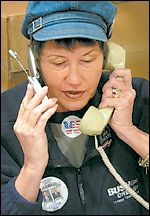
OHIO VOTES: Sandi Baumert calls voters from Bush-Cheney headquarters in Ohio.
Photo: Andy Nelson - STAFF
With polls showing the race still neck and neck - and with very few undecided voters left - strategists on both sides now agree that whoever does a better job at getting supporters to vote will probably win. The campaigns, along with a number of outside groups, are boasting the largest turnout operations in history, with hundreds of thousands of volunteers working the phones and going door to door in key battleground states. The overall effect is already clear in the vast increase in newly registered voters and, more recently, in high participation in early voting in states that allow it.
But while all this activity is aimed at electing a candidate, it may also have a broader cultural effect, simply by involving millions - volunteers and the voters they contact - in a massive exercise in civic participation of a kind not seen in decades. ... [...more]
Movie maker declares war on intimidation
Oliver Burkeman,The Guardian, November 1, 2004
The filmmaker Michael Moore has announced a large-scale effort to combat dirty tricks during tomorrow's US election by stationing hundreds of people with video cameras outside polling stations.
"I'm putting those who intend to suppress the vote on notice: voter intimidation and suppression will not be tolerated," Mr Moore said in a statement, wading into a controversy in which Democrats accuse Republicans of planning to reduce turnout, especially among ethnic minorities, by employing thousands of people to stop voters at the polls and challenge the validity of their registrations.
Mr Moore, the director of the documentary Fahrenheit 9/11, said 1,200 professional and amateur videographers would descend on polling stations in Florida and Ohio, the two battleground states that have been the focus of the most serious allegations. The last few months have seen an unprecedented drive to register new voters, especially in black neighbourhoods of Florida and throughout Ohio.
But the new registrations could be deemed invalid as a result of errors made on the forms, from corner-cutting by workers paid to sign people up, or from deliberate fraud. ... [,,,more]
BEHIND THE NEWS: How you can drag and click Americans into ousting Bush
ANNEMARIE EVANS
As an American, Brett Rierson would love to see regime change - in Washington .
"How do you enact regime change at home for the Americans? Vote by vote," said the Hong Kong-based Democrat, who turned 38 earlier this week. "The best birthday present people could give me is to go register and vote Democrat."

To help Americans worldwide do just that, Mr Rierson - who is the vice-chair for voter assistance at Democrats Abroad Hong Kong - has been instrumental in setting up a website, not directed at Americans, but at their friends and neighbours of other nationalities, to persuade US citizens to vote.
"This is about enabling non-Americans to have a voice in Washington by enabling Americans to vote," he said. "There seems to be such a groundswell internationally against the American administration and against overseas Americans that this was giving voice to that protest."
Inspired by his Belgian wife, Rosa, who felt frustrated at not being able to choose arguably the most powerful man in the world, whose policies go way beyond the US, Mr Rierson and Democrat co-workers Ethan Schoonover and Mark Greene started the website www. overseasvote.com last month.
It provides profiles of Democratic Senator John Kerry and US President George W. Bush, plus details on how to register, links to other sites for more political information, and in-depth detail on election issues. Although Mr Rierson does not hide the fact on his website that he would like people to vote Democrat - little hints such as "Wake up America - vote Democrat in 2004!" and "Help defeat Bush in 2004!" tend to give it away - he is also keen to ensure that Americans register, whatever their political leanings. ... [...more]
Video shows U.N. Afghan hostages
BBC News, October 31, 2004
Three UN workers held hostage by militants in Afghanistan have appeared in a video shown by Arabic TV.
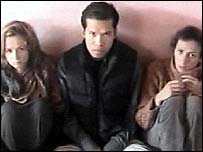 The three appeared unharmed in the video, in which their kidnappers called for the release of prisoners from Afghan jails and Guantanamo Bay.
The three appeared unharmed in the video, in which their kidnappers called for the release of prisoners from Afghan jails and Guantanamo Bay.
Filipino Angelito Nayan, Annetta Flanigan from Northern Ireland and Shqipe Habibi from Kosovo were seized on Thursday at gunpoint.
They were in Afghanistan to help organise recent presidential elections.
... ...
In the video footage, the three hostages were shown crouching against a wall beside a masked man.
A man off camera asks the hostages why they have come to Afghanistan.
"There are many organisations that come here and do many things for the Afghan people - build roads, build schools, irrigate fields," a tearful Ms Flanigan replies.
"And we thought that it's also useful to come here in Kabul in Afghanistan - we didn't come to do any harm."
Taleban links
There have been repeated claims that a militant Islamic group, the Army of Muslims (Jaish-e-Muslimeen) is holding the three foreigners.
Several messages have been released issuing threats to the lives of the hostages unless Afghan prisoners are released and foreign forces withdrawn from Afghanistan.
The militants also want an end to UN operations there.
... [...more]
Now They're Registered, Now They're Not
Election Officials Express Dismay at Extent of Misinformation, Variety of Tricks Targeting Voters
Jo Becker and David Finkel, Washington Post, October 31, 2004;
As if things weren't complicated enough, here comes the dirt.
Registered voters who have been somehow unregistered. Democrats who suddenly find they've been re-registered as Republicans. A flier announcing that Election Day has been extended through Wednesday.
Dirty tricks are a staple of campaigns, but election officials say this year's could achieve new highs in numbers and new lows in scope, especially in key battleground states such as Florida and Ohio, where special-interest groups have poured in to influence the neck-and-neck race between President Bush and Sen. John F. Kerry.
"In my 16 years as an election administrator, I've never seen anything like this," said Ion Sancho, supervisor of elections in Leon County, Fla. "I see it as an expression of a political culture that has evolved in the United States of win at any cost. It's not partisan, but it's just lie, cheat and steal, and ethics be damned."
The problem in Leon County: Students at Florida State and Florida A&M universities, some of whom signed petitions to legalize medical marijuana or impose stiffer penalties for child molesters, unknowingly had their party registration switched to Republican and their addresses changed. ... [...more]
What Democracy Needs: Real Races
David S. Broder,Washington Post, October 31, 2004
Without knowing -- or even being able to make a confident guess -- who will win Tuesday's presidential election, let me say for the record that this has been one of the best and most exciting White House battles I've ever covered.
Both candidates delivered their messages well, and the crowds of supporters were among the biggest and most enthusiastic since my first campaign in 1960.
At a University of Chicago panel the other night, we heard the complaint that some of the biggest issues facing the country -- notably, what steps to take next in Iraq and what to do about the gaping hole in the budget and the lack of any plan to meet the looming costs of Social Security and Medicare -- were barely addressed.
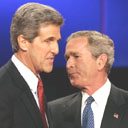 True enough, but the issues that were discussed in the three debates were certainly germane to people's lives: the war on terrorism and collaboration with allies; the expensive, inefficient health care system; and, not least, the distribution of the tax burden to finance our government.
True enough, but the issues that were discussed in the three debates were certainly germane to people's lives: the war on terrorism and collaboration with allies; the expensive, inefficient health care system; and, not least, the distribution of the tax burden to finance our government.
... ...
If you want to find fault with this campaign, turn your eyes from the presidential race to the elections that will determine the makeup of the new Senate and House. That is where our system of representative government really failed.
In theory, one-third of the 100 Senate seats are being contested this year. But in fact only nine seats are in doubt -- six of them where incumbents have retired.
In almost all the others, the gap in finances is so great that it's like sending The Post newsroom's softball team out to play the Boston Red Sox. Even in states that are highly competitive in the presidential election, Senate campaigns often are walkovers.
Look, for example, at Ohio. On Sept. 30 Republican Sen. George Voinovich had $4.2 million in cash on hand; his Democratic opponent had $93,276. In Nevada, another presidential battleground, Democratic Sen. Harry Reid had $3.3 million, his Republican opponent, $15,322. Similar mismatches can be found in many other states.
The claim can be made that these are well-entrenched, popular incumbents who probably would win anyhow. But in more than half the states with Senate races, voters are being denied the experience of seeing their senators seriously tested on their records or their plans.
The situation in the House of Representatives is similar -- but markedly worse.
Of the 435 House districts, barely three dozen have real races this fall. This means that 400 of the members are not being subjected to the discipline of explaining and defending their legislative votes to their own constituents.
In their most recent filings, 47 House members were sitting on piles of $1 million in campaign cash. Fifteen of them had no major-party opponents; virtually all the rest might as well have gone unchallenged. In 21 of their districts, the opponents had less than $10,000 cash on hand for the final weeks of the campaign.
With two-thirds of the Senate seats and more than 90 percent of the House seats effectively uncontested in November, the basic principles of representative government are being severely eroded. Repairing that damage is perhaps the most important political reform on the agenda.
... [...more]
Bin Laden video--New Tape
Maria Newman, New York Times, October 29, 2004
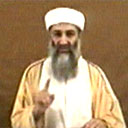 Al-Jazeera via AFP-Getty Images
Al-Jazeera via AFP-Getty Images
The tape is the first featuring Osama bin Laden to surface in more than a year and comes just days before the U.S. elections.
.......................
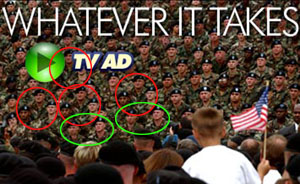 The fake troops in Bush's new ad
The fake troops in Bush's new ad
mithras the prophet,
October 28, 2004, (From the diaries -- kos)
.....................
The battle of the living room screens
Dan Glaister,The Guardian, October 30, 2004
While the candidates race through the swing states, the real election battleground is the American living room.
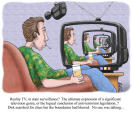 Each night, and throughout the day on many cable channels, the pundits and pontificators create their own frenzy, feeding on and exaggerating events on the campaign trail.
Each night, and throughout the day on many cable channels, the pundits and pontificators create their own frenzy, feeding on and exaggerating events on the campaign trail.
Unlike British television news, the American networks thrive on their partisanship. And the presenters, too, are proud to wear their political beliefs on their sleeves.
Rupert Murdoch's Fox News has Bill O'Reilly, rumpled and snarling, renowned for telling his guests to "shut up", and embroiled in a less than savoury lawsuit involving a young female Fox producer and allegations of phone sex.
CBS, if you believe the Bush administration, is the liberal home of the veteran anchor Dan Rather and his 60 Minutes programme.
MSNBC has Ron Reagan, liberal son of the late president, an engaging and unflappable presence.
Facing him most nights on MSNBC is Joe Scarborough, a former Republican congressman for Florida and a self-proclaimed redneck. His role seems to be to try to inflame Reagan and the other liberals on the channel's After Hours political talkshow.
ABC has Chris Matthews, the closest US television gets to a Jeremy Paxman, renowned for his forensic attention to detail. A political junkie and policy wonk, his hoarse-of-voice pumped-up persona communicates an enthusiasm for politics that is both irritating and engaging.
Then there is CNN, the doyen of round-the-clock cable channels. CNN is a Republican surrogate or an example of the liberal degradation of the nation's media, depending whom you ask and which part of the country they live in.
[...more]
Bush Speaks: The Conservative Home of Progressive Politics
What A Load Of QaQaa
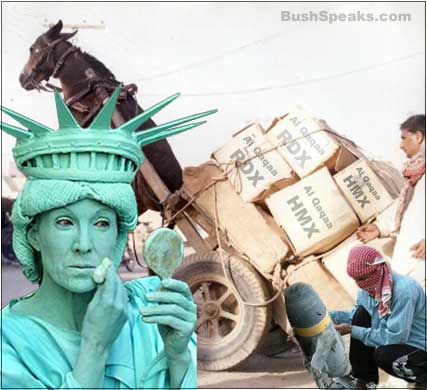
"Whether or not we can be ever fully safe
is up -- you know, up in the air."
— G. W. Bush (Source: CBS News)
What's Come Over Us?
Crammed with Distressful Politics
JULES RABIN, Counterpunch, October 27, 2004
Politics, grown fat on popular outrage and indignation, has taken a seat at the common table.
 Breakfast at our house often begins with a rant by me, over some current astonishment that has dropped down on us out of the overnight news; my wife enduring and sympathizing. Hardly a dinner in company, or a convivial Sunday brunch, fails to bring out a session of deploring what the crowd in and around the White House have lately perpetrated: the rigged war in Iraq first and foremost, that improbable man in the White House second, and his Devilish Works third.
Breakfast at our house often begins with a rant by me, over some current astonishment that has dropped down on us out of the overnight news; my wife enduring and sympathizing. Hardly a dinner in company, or a convivial Sunday brunch, fails to bring out a session of deploring what the crowd in and around the White House have lately perpetrated: the rigged war in Iraq first and foremost, that improbable man in the White House second, and his Devilish Works third.
We wonder: could his smirk and his duplicity and his strange manner of simultaneously bullying and wheedling actually fit, with lock and key exactness, some streak of character running through our country? What have we become, that we could adopt such a visibly warped man as maximum leader? To what dread place are he and his faction taking us?
The urgent hot breath of Southern and other rising fundamentalisms has reached our faces even in chill, steady New England. The thinly progressive attitudes and legislation of the three-quarters century past that we have come to take for granted as a minimum basis of ordinary civic decency and security, have been dissolving under us like a sandbank scoured by a current grown suddenly swift, dark, and powerful.
Hard-bitten, turned inward, and scared ... will that be the new face of America, a consequence of our cohabitation with this erroneous President? [...more]
Gulf War 2 (aka World War 2.5)
 It's the mother of all Flash games.
It's the mother of all Flash games.
[....and it reflects the chaos, confusion and quagmire that Iraq has now become: aryabhatt]
[NB. It's old hat now, but in early 2003 this page was hopping. Occasionally a pro-war loony will email me to sneer that things didn't turn out like this. The ability to miss the point is strong in some people. This game starts with a simple premise: that Bush/Blair were telling the truth. Saddam had WMD and was willing to use them.... Dermot O' Connor, animator, Idleworm.com]
Ho Hum: Tweedle Dum, Tweedle Dee
Strange Relations: George Bush / John Kerry
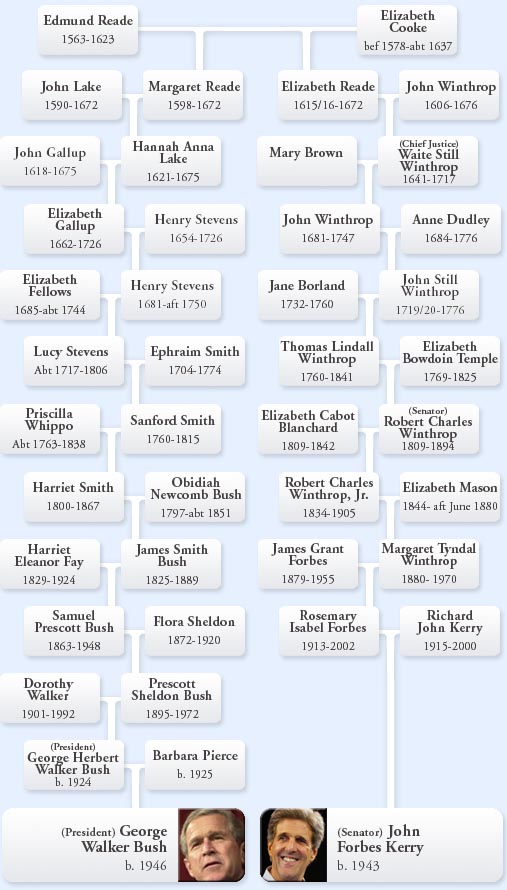
It can happen ... only in America ... God Bless America.
BUSH MUST WIN IN NOVEMBER 2004
or else we are bollixed. I am not kidding.
Riverbendblog: American Elections 2004
''Sure, you can vote for this man or that one, but in the end, there’s something bigger, more intricate and quite sinister behind the decisions. Like in that board game Monopoly, you can choose the game pieces- the little shoe, the car, the top hat… but you can’t choose the way the game is played. The faces change but the intentions and the policy remain the same.''
The case against Kerry: He's just another Democrat robot.
The idea that John Kerry is a better option than Bush is largely based on wishful thinking. Throughout the debates, he has derided Bush for being too soft (!) in the war in Iraq, as well as in the War on ''Terror''. I take him at his word. He will have to prove himself to be a far tougher Commander in Chief than Bush if he's to have any chance of surviving politically. The prisoners in Abu Ghraib had better bend over and grab their ankles if JFK wins.Kerry will turn what's left of Fallujah into paste. Civilians, Shmivilians. He promised as much in the debates. He claims that he'd have voted for the Iraq war a year ago, even knowing that they had no WMD. This puts him TO THE RIGHT OF BUSH!
Kerry fell all over himself to praise Israel, a country whose army has a predilection for the cold blooded murder of Palestinian children. Handsome Mr. Edwards is a fellow Likudnik. Kerry spoke about his policies being "good for Israel" in the debates. Win-Win for the war criminal Sharon, it seems. There will be no peace in the region as long as the Israel/Palestine struggle is unresolved.Kerry will almost certainly handle the war in Iraq with more competence than Bush, thereby prolonging it, rather than shortening it. Worse, if the war goes badly (and it probably will), the Republicans will skewer the Democrats, blaming them for the shitstorm that they created. Charming.
...
I won't argue that Kerry would be better on domestic policy (healthcare, education, pollution, etc.) than Bush. But so what? It's the wider consequences to the rest of the world that matter in 2004, not whether a few million more Americans can get health insurance, or a less-worse education for their obnoxious brats.
If you're scared of America becoming an Empire under Bush,
I have news for you: it's been turning into an Empire under Democrats and Republicans for several decades. Remember Vietnam? Remember Salvador Allende's assassination? Remember the odious South American Juntas propped up by the CIA for the best part of the 20th century? Remember Saint Carter's support for the Afghan Mujahedeen? Nice job Jimmy. Teaching Osama how to destroy a superpower really worked out well, eh?
If you want the Empire to be destroyed, it can be done far more quickly from within:
If it were done when 'tis done, then 'twere well
It were done quickly
--Macbeth, by Edward De Vere, 17th Earl of Oxford
We need an incompetent Hitler-wannabee in charge, preferably surrounded by a
cadre of religious nutjobs. Bush/Caligula and his goons are the men for the job.Which leads me onto
The case for Bush: Give 'em enough rope!
Bush has one great virtue: sane people hate him. He's like a reverse litmus test for decency - if you despise him, you're OK. He has taken what could easily have been a Second Rome (The former American Republic) and almost run it into the ground. Four more years of Bush and the pseudo-Empire will fall apart under the weight of its own budget deficit.There are so many good things to look forward to under a second Bush administration:
--A re-instituted draft will radicalise a generation of young Americans in a way not seen since the sixties. The Canada escape route has been closed, but Mexico is willing and able to take talented young Americans into her swarthy bosom, as is Europe. America's loss, their gain. Another draft-dodging option is to be openly gay. This will further homosexualise American youth, undermining Christian values enormously.
--Crackpot Supreme court judges will ban abortion, turning women against the Republicans in droves. Wire-hanger companies will make millions of dollars. I've already bought thousands of shares. I advise you to do the same. My new book "Backstreet Abortions for Dummies" will be released sometime in 2005, Christ willing.
--Greenhouse warming will continue thanks to Bush's rejection of the Kyoto treaty. Rising sea levels will destroy the State of Florida. Serves 'em right for voting for Bush and his twisted brother Jeb. If the sea rises high enough it might drown the mid-west, thereby taking many red States off the map. (Laugh as the ''conservative'' red-staters plea for federal assistance!)
--A huge number of the working classes in America vote for Bush, even though his policies hurt them the most. "Gee Maw, we shur did have fun spendin' that $300 tax cut the preznit giv us! Whoo-EE!" Under Bush, they'll be worked to death in a minimum wage McJob with no health care. Good. Serves the stupid fuckers right for voting for the guy. This is Darwinian natural selection in progress my friends. Kill 'em off quick, Bush style!
--There is a real possibility that Bush is suffering from a degenerative mental illness. The decline in his speaking skills over the last 4 years is remarkable. I personally believe that he wasn't wearing a radio transmitter on his back in the first debate. It's more likely that it was a medical device, feeding him brain juice, or whatever it is that keeps him breathing. Imagine the hilarity of watching him decay into a shuddering Lovecraftian shell of a human being over the next 4 long, stressful years! Delicious. ''Those whom the Gods wish to destroy They first make mad.''
So now you see. It's not a pretty choice, is it? Even the American Conservative is justifiably scared of a Bush victory!
Bush has behaved like a caricature of what a right-wing president is supposed to be, and his continuation in office will discredit any sort of conservatism--for generations.
For generations. All we have to do is suffer 4 more years of Bush and his loons, and they'll finish the American right for ever! Ralph Nader knows this. He can't say it, but it's why he's running. He needs to keep Bush in, in order to destroy conservatism/imperialism from the inside. The Republicans are too full of themselves to see this. Nader is laughing at them.
IMAD KHADDURI, a former Iraqi nuclear scientist who hates Bush - wants him to win - so that Dubya can lead the American Empire to ruination. Isn't life strange?
To me, the whole truth about Iraq is so horrible that it would even sink Kerry instantaneously. Because he is a 'me-too' candidate. The best hope for the rest of the world, apparently, I have come to believe, is that Bush should win and sink the whole empire into complete isolation and hopefully into its perdition.
George Bush and his legions of stormtroopers have created an unholy mess. Don't give them a dignified exit by voting them out of office. Let them sit on the big stinking pile for the next 4 years. It's no more than they deserve. Kicking them out is letting them off the hook.I know that some of you want to vote for Nader. Tempting as this is, it is a wasted vote. By voting for Ralph, you run the risk of allowing Kerry into the Whitehouse! I'm begging you people, vote with your brain, NOT YOUR CONSCIENCE!
* * * VOTE BUSH ! * * *
Queen Be
The 'Sweet Potato' Recipe for Happiness: Live It Up
Ken Ringle,The Washington Post,October 25, 2004

Some seek greatness and some have greatness thrust upon them. It is the axiom of the Sweet Potato Queens that by age 40 almost every woman has had greatness thrust upon her just by surviving, never mind hitting, all the curveballs life throws at her.
Therefore, the Sweet Potato gospel goes, instead of succumbing to the too-frequent middle-age female mind-sets of exhaustion, bitchiness and wound-licking, it is incumbent on all such women to get in touch with their Inner Queen and generally smart-mouth their way to an outrageous, regal and beatific better life. Not to mention a good time.
"You should never wear panties to a party," counsels author and boss queen Jill Conner Browne.
Browne, 51, a brown-eyed, six-foot former fitness instructor from Jackson, Miss., is the doyenne of the Sweet Potato Queen movement ... ...
... Among her tips on achieving Sweet Potato royalty:
• Along with Cute Shoes, every woman needs five men in her life: one to fix
things, one to pay for things, one to dance with, one to talk to and one for
sex. Four of the five can be gay.
• Tragedy deserves food. There are
four basic food groups -- sweet, salty, fried and au gratin. Recipes include
Twinkie Pie (aka White Trash Trifle).
• "There's nothing wrong with men
in general. . . . Most of them are just fine. Really," she writes. But it would
be crazy not to manipulate them with sex because "men's brains are migratory and
usually located in their summer home, way south."
Further describing Browne's brand of humor, let alone her writing style, is not a job for the timid, but think of it like this: If Mel Brooks and Lily Tomlin were from Mississippi and had a daughter who grew up there in a household with Mark Twain, Dave Barry, Florence King and former Texas governor Ann Richards, she might have looked on life a bit like Jill Conner Browne.
But even more confounding is the power with which the Sweet Potato Queens' grin-and-bare-it philosophy has resonated in readers from Birmingham to Beijing. Her thousands of laughter-liberated followers swap life stories and advice like a sisterly global encounter group on the SPQ Web site's Message Board of Love. They speak of Browne the way women once spoke of Gloria Steinem and Betty Friedan -- as an empowering force who not only lifts women's spirits but revolutionizes their lives.
[...more]
The New York Times > Opinion > Op-Ed Columnist: Bush's Blinkers
Bob Herbert, New York Times, October 22, 2004

Does President Bush even tip his hat to reality as he goes breezing by?
He often behaves as if he sees - or is in touch with - things that are inaccessible to those who are grounded in the reality most of us have come to know. For example, with more than 1,000 American troops and more than 10,000 Iraqi civilians dead, many people see the ongoing war in Iraq as a disaster, if not a catastrophe. Mr. Bush sees freedom on the march.
Many thoughtful analysts see a fiscal disaster developing here at home, with the president's tax cuts being the primary contributor to the radical transformation of a $236 billion budget surplus into a $415 billion deficit. The president sees, incredibly, a need for still more tax cuts.
The United States was attacked on Sept. 11, 2001, by Osama bin Laden and Al Qaeda. The president responded by turning most of the nation's firepower on Saddam Hussein and Iraq. When Mr. Bush was asked by the journalist Bob Woodward if he had consulted with former President Bush about the decision to invade Iraq, the president replied: "He is the wrong father to appeal to in terms of strength. There is a higher father that I appeal to."
Last week the Jaffee Center for Strategic Studies at Tel Aviv University said in a report:
"During the past year Iraq has become a major distraction from the global war on terrorism. Iraq has now become a convenient arena for jihad, which has helped Al Qaeda to recover from the setback it suffered as a result of the war in Afghanistan. With the growing phenomenon of suicide bombing, the U.S. presence in Iraq now demands more and more assets that might have otherwise been deployed against various dimensions of the global terrorist threat."
There are consequences, often powerful consequences, to turning one's back on reality.
The president may believe that freedom's on the march, and that freedom is God's gift to every man and woman in the world, and perhaps even that he is the vessel through which that gift is transmitted.
But when he is crafting policy decisions that put people by the hundreds of thousands into harm's way, he needs to rely on more than the perceived good wishes of the Almighty. He needs to submit those policy decisions to a good hard reality check.
... ...
Dr. Gene Bolles spent two years as the chief of neurosurgery at the Landstuhl Regional Medical Center in Germany, which is where most of the soldiers wounded in Iraq are taken.
...He said "They all seemed young. Certainly younger than my children. As a neurosurgeon I mostly dealt with injuries to the brain, the spinal cord, or the spine itself. The injuries were all fairly horrific, anywhere from the loss of extremities, multiple extremities, to severe burns. It just goes on and on and on. ... As a doctor myself who has seen trauma throughout his career, I've never seen it to this degree. The numbers, the degree of injuries. It really kind of caught me off guard."
If you're the president and you're contemplating a war in which thousands of deaths and tens of thousands of these kinds of injuries will take place, you have an obligation to seek out the best sources of information and the wisest advice from the widest possible array of counselors. And you have an absolute obligation to exercise sound judgment based upon facts, and not simply faith.
In a disturbing article in last Sunday's New York Times Magazine, the writer Ron Suskind told of a meeting he'd had with a senior adviser to the president. The White House at the time was unhappy about an article Mr. Suskind had written.
According to Mr. Suskind, "The aide said that guys like me were 'in what we call the reality-based community,' which he defined as people who 'believe that solutions emerge from your judicious study of discernible reality.'
" The aide told Mr. Suskind, "That's not the way the world really works anymore. We're an empire now, and when we act we create our own reality."
Got that? We may think there are real-world consequences to the policies of the president, real pain and real grief for real people. But to the White House, that kind of thinking is passé. The White House doesn't even recognize that kind of reality.
Prince Harry: The Prince and the Paparazzi
Independent.co.uk, Profiles,October 24, 2004
Henry Charles Albert David (that's Sir to you, and Harry to the press) is a very angry young man. He has been hunted down by a new breed of press photographer and riled by accusations of cheating in his A-levels. Few would begrudge him a swing at his tormentors. But it will earn him still fewer admirers

Harry. It's a name that conjures up an image of naughtiness and naivety. It's not a proper grown-up name, but there's something rather endearing about it. And, true to character, that's how Prince Harry has always been portrayed by those who know him best: irrepressibly mischievous, daring and sometimes foolhardy. But always curiously lovable. This week his image changed.
"Oh, Harry?" people in the Palace would say to me with a knowing smile. "He's fine. He's just Harry - and he'll always be OK." Well, he isn't OK. He's riled and he's hurting. What's more - most unregally - he's letting it show.
His real name, of course, is Henry. In keeping with royal tradition, the infant prince was given a bewildering array of names when he was christened on 21 December 1984. In the grandeur of St George's Chapel, Windsor, the tiny tot was baptised Henry Charles Albert David - ample material to make any future bride comprehensively tongue-tied, just as Diana, Princess of Wales, was at her wedding. But, as Henry's dad let slip shortly after the Princess's death, his given name is rarely used. "Harry is only called Henry when he's been very, very naughty," the Prince of Wales said. I suspect that, after that now infamous fracas outside a London nightclub, "Henry" may well have been called into service.
There will, though, be enormous sympathy for him in royal circles - not least from his father and brother. For the 20-year-old prince has done what most of his family have been itching to do for decades: lashed out at the bane of their lives ... the press.
[...more]
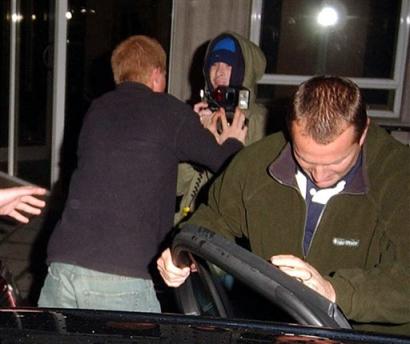
Britain's Prince Harry, back to camera, clashes with photographer Chris Uncle, rear, outside an exclusive London west end nightclub in the early hours of Thursday Oct. 21, 2004. Both Prince Harry and the photographer were slightly injured in the incident which took place at 03.30am. (AP Photo/CharlIe Pycraft)
Staying or Going? Some Possibilities if Bush Wins
By Mike AllenWashington Post, October 22, 2004
President Bush plans major changes in his Cabinet if he wins a second term -- perhaps nominating the first female defense secretary and first black attorney general -- but very little change among the small group of his closest advisers.
Public talk about the second-term lineup is verboten around the White House, since officials realize it would look presumptuous and even foolish with the race so close. But Chief of Staff Andrew H. Card Jr. and senior adviser Karl Rove have a mental list of likely switches, according to colleagues, and people close to the White House are chattering about the possibilities.
Many are speculating that Defense Secretary Donald H. Rumsfeld would depart if Bush defeated John F. Kerry, although perhaps after he remained a while longer in hopes of seeing improved conditions in Iraq. Rumsfeld's likely replacement? Condoleezza Rice, the president's national security adviser, who would be the first female Pentagon chief.
According to Republicans, the most logical successors to Rice would be Deputy Secretary of Defense Paul D. Wolfowitz, an architect of the Iraq war who might be chosen if Bush were feeling vindicated; I. Lewis Libby, chief of staff for Vice President Cheney; and Rice's current deputy, Steven J. Hadley.
Secretary of State Colin L. Powell, who has repeatedly been cut out of major decision making, surprised some Washington speculators this summer by suggesting he might stay on. One possible replacement would be former senator John C. Danforth (R-Mo.), who was a finalist to be Bush's running mate in 2000 and who is now the U.S. ambassador to the United Nations.
Friends say that Attorney General John D. Ashcroft realizes he would be unlikely to be asked to stay on. The president has hinted he would be interested in hiring Larry D. Thompson, Ashcroft's former deputy. Thompson would be the first African American to hold the job.
... ...
There is little doubt that Karl Rove, White House senior adviser and the chief architect of Bush's reelection campaign, would remain in his job, provided his election strategy succeeds.
Communications director Dan Bartlett, another member of the White House's Texas mafia, is so close to the president that his influence does not depend on his title. Insiders say he could fill a variety of jobs, including his current one.
[...more]
..............................
Behind Bush's Rhetoric
By E. J. Dionne Jr., Washington Post, October 22, 2004;
What does the war on terrorism have to do with the privatization of Social Security and the possibility of a national sales tax?
Nothing. And everything
In the final days of this campaign, voters have to consider not just whom they should vote for but also how their votes will be used by those they elect.
President Bush wants to win by twisting and distorting John Kerry's record on terrorism. Bush proposes to win by persuading the persuadable that in a time of danger, it's safest to stick with the guy in power.
But Bush also has a remarkably broad agenda to change the Social Security and tax systems. He's not big on the specifics. Yet if Bush is reelected, he will claim a domestic mandate that will come as a surprise to many who voted for him.
We know this because Bush lacked a policy mandate in 2000 -- he didn't even win the popular vote -- and nonetheless pushed through two rounds of tax cuts tilted to the wealthy that have built those staggering long-term deficits.
In 2004, voters should pay attention to the mandate behind the curtain.
Begin with Bush's distortions of Kerry's record on terrorism.
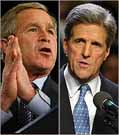 Here's Bush in Mason City, Iowa, on Wednesday: "Senator Kerry was recently asked how September the 11th had changed him. He replied, 'It didn't change me much at all.' And this unchanged worldview becomes obvious when he calls the war against terror primarily an intelligence and law enforcement operation, rather than what I believe: a war which requires the full use of American power to keep us secure."
Here's Bush in Mason City, Iowa, on Wednesday: "Senator Kerry was recently asked how September the 11th had changed him. He replied, 'It didn't change me much at all.' And this unchanged worldview becomes obvious when he calls the war against terror primarily an intelligence and law enforcement operation, rather than what I believe: a war which requires the full use of American power to keep us secure."
By taking seven of Kerry's words out of a much longer statement, Bush twisted his opponent's position beyond recognition. Here is journalist Matt Bai's account, in the New York Times Magazine article Bush was citing, of what Kerry actually said when he was asked how Sept. 11 had changed him:
"I mean, it didn't change me much at all. It just sort of accelerated, confirmed in me, the urgency of doing the things I thought we needed to be doing. I mean, to me, it wasn't as transformational as it was a kind of anger, a frustration and an urgency that we weren't doing the kinds of things necessary to prevent it and to deal with it."
Bai added: "Kerry did allow that he, like other Americans, felt less safe after 9/11."
Not exactly the guy Bush described.
But if Bush will say whatever it takes about terrorism to win reelection, what will he do with his victory?
[...more]
Hassan Pleads for Life
Washington Post,Video & Audio, October 22, 2004; 11:40 AM
In a video aired on Arab TV network al-Jazeera, the kidnapped CARE director in Iraq, Margaret Hassan, weeps as she pleads with the British people to act to save her life.

Margaret Hassan is seen weeping and pleading for British Prime Minister Tony Blair (news - web sites) to withdraw troops from Iraq (news - web sites) and not bring them to Baghdad. (AP/Al-Jazzera via APTN)
Woman Seeks Husband on a Billboard
October 22, 2004
SYDNEY (Reuters) - A Chinese woman living in Sydney has taken the unusual step of advertising for a husband on a billboard outside a cinema in Sydney's eastern suburbs.
Helen Zhou, from Shanghai, said she had tried Internet dating but found men did not want to commit.
"People are happy to date but they don't want any commitment, only temporary relationships," the middle-aged Zhou told her weekly local newspaper, the Southern Courier.
Zhou spent A$5,000 (US$3,700) on the billboard which has a large headline "HUSBAND WANTED" and a lists of requirements, such as age up to 45, good health, non-smoker and drinker, Caucasian, solid financial background and a good sense of humor.
[...more]
Cash from chaos
Christopher Dickey and Tom Masland, Newsweek, October 25, 2004
 ...ReflexNews
...ReflexNews
Price explosion: Sabotage and terrorist attacks are turning up the heat on the world’s jittery oil markets
A massive tower of smoke roiled skyward above the green landscape of the Niger Delta on the west coast of Africa. Oil was burning near a ruptured pipeline, and the huge Anglo-Dutch multinational Shell Petroleum Development Co. of Nigeria reported sabotage caused the break. Were rebels behind it? Terrorists? Or just thieves trying to steal oil and scrap metal? The only clue was a hacksaw at the scene, apparently dropped in a moment of panic when the line erupted like a gusher.
International oil markets shuddered. YOUTHS TORCH OIL PIPELINE, PRICE HITS $54.45 PER BARREL, screamed the headline of Nigeria's leading paper the next day, exaggerating the connection, certainly, but not by much. The global oil supply is so tight, the market psychology so close to the brink of crisis that even small disruptions can send prices soaring to new records.
Wasn't it just last year that we heard the invasion of Iraq would help make oil cheaper, safer, more secure? President George W. Bush came to office alarmed about increasing U.S. dependence on autocratic and corrupt regimes that rule atop the world's biggest oilfields: among them the mullahs of Iran, the royal family of Saudi Arabia, the democratic yet venally corrupt government in Nigeria.
And then there was Saddam Hussein. By invading Iraq, American forces would remove one dictator and the threat he posed to the interests and security of the United States. They would also stabilize one of the world's biggest oil producers, and begin spreading democracy.
More oil would flow to market, and more freedom would flow to the region. Yet we've seen the opposite. The world's autocratic and corrupt oil producers are richer than they have been in years. OPEC members alone expect an estimated $300 billion in total revenues this year, much of it in windfall profits.
[...more]
Analysts point to many reasons for the huge spike in prices, more than 60 percent over the past year. In every troubled corner of the oil-producing world the list of shocks has grown, from terrorist attacks in Saudi Arabia to hurricanes in the Gulf of Mexico; the Yukos commotion in Russia; unpredictable demagoguery in Venezuela.
Shipping lanes in Asia are plagued by pirates and threatened by terrorists. There's growing unrest along the African coast. All this is happening while demand from China surged 30 percent last year, beyond almost anyone's expectations. A cold winter is coming on, upping demand for heating oil, and Americans keep driving like there's no tomorrow.
Yet it's the untamed insurgency in Iraq that has had the most pernicious impact on energy supplies and price speculation. The country should be a major oil producer.
Under Saddam Hussein, despite sanctions, it was able to pump almost 3 million barrels a day. Now, because of widespread sabotage, it has to work very hard to export 2 million. In a tribute to the bravery of its workers, it reached 2.5 million barrels on Sept. 27. But illusions that Iraq could finance its own occupation evanesced like a mirage last year.
Officials estimate pipeline sabotage alone is costing the country (Iraq) $7 million a day. [...more]
... The Saudis' own projected windfall is estimated upwards of $50 billion over the next year.What the Saudi government does with that money is critical, says Rachel Bronson of the Council on Foreign Relations: "The answers will tell us how serious they are about reform." Crown Prince Abdullah, the de facto ruler, has said a large part of the money will go into paying down the country's huge debts.
More billions are supposed to go into vocational training for young Saudis, who've been easy recruits for the likes of Osama bin Laden. And there will also be foreign investments. But even Saudi officials close to the top leadership worry the flood of money will bring back the regime's old complacency. "The big risk is overconfidence," says an adviser to one of the senior princes.
In fact, the biggest risk is that the violence we've already seen in Saudi Arabia intensifies, that the Iraq war starts to spill across the border, or there's a dramatic blow to the regime that nobody could anticipate.
If a villager with a hacksaw in Nigeria can move prices for a few minutes, an assassin in Arabia could change them for years to come.
-With Rod Nordland in Amman, Frank Brown in Moscow and Maziar Bahari in Tehran
Team Bush declares war on the New York Times
Eric Boehlert, Salon.com, October 19, 2004
The GOP attack on a Times Magazine story is the latest attempt to rally the conservative base by "whacking a newspaper with 'New York' in its name," says executive editor Bill Keller.
Oct. 19, 2004 During the closing weeks of the 2000 presidential campaign, at a campaign rally, George W. Bush spotted a veteran political reporter and turned to Dick Cheney, standing next to him on the platform, to remark, "There's Adam Clymer, major league asshole from the New York Times." "Oh yeah, big time," replied Cheney.
Unbeknownst to them, their locker-room exchange was caught by an open microphone.
Four years later, nobody connected with the Bush-Cheney campaign appears even slightly concerned about being caught denigrating the Times; they're more than happy to do it on the record, as the White House has all but declared open warfare on the nation's leading newspaper.
The latest volley came over the weekend when Republican campaign officials accused the Times Sunday magazine of fabricating a provocative quote from Bush in which he bragged -- behind closed doors and speaking to wealthy supporters -- that he would announce plans for "privatizing of Social Security" early next year, after his reelection.
When Democrats jumped on the remark, dubbing it the "January surprise," Republican National Committee Chairman Ed Gillespie dismissed the Times' work as "Kitty Kelley journalism," insisting Bush never uttered the phrase attributed to him.
But the Times stands by the 8,300-word story by Ron Suskind, author of "The Price of Loyalty: George W. Bush, the White House and the Education of Paul O'Neill," a revealing account of the former secretary of the treasury published earlier this year. [...more]
...............................
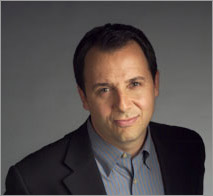 ...Ron Suskind
...Ron Suskind
Reality Based Reporting
Eric Boehlert, Salon.com, October 20, 2004
Believe it or not, Bush aides once welcomed reporter Ron Suskind into the West Wing, invited him to attend some meetings, gave him lengthy interviews and even found him his own desk to work at inside the White House. That was back in early 2002, when Suskind, who had won a Pulitzer Prize while working for the Wall Street Journal, was profiling Karen Hughes for Esquire magazine. ... ...
Suskind has pulled back the White House curtain perhaps more effectively than any other reporter. And the portraits Suskind has painted of Bush and his advisors are not at all flattering, though they are reality-based.
Suskind's latest article, "Without a Doubt," appeared in Sunday's New York Times Magazine, and it is arguably the most damning of all. It made headlines when the Kerry campaign seized upon a remark Bush reportedly made to top donors, quoted in the article, during a closed-door lunch in September, promising that after his swearing in in January he would "come out strong with ... privatizing of Social Security."
The Bush campaign denied the quote, labeled it a fabrication, accused the Times of practicing "Kitty Kelley journalism" and attacked Suskind as a partisan hack, even including his picture and voter registration information in an e-mail blasted to the national press corps as a combination of preemptive intimidation and inoculation.
"Without a Doubt," which relies upon mostly Republican sources, examines the extraordinary degree to which Bush and his senior aides are "faith based" in their decision making, and disdain those who are "reality based."
It also discusses how Bush allegedly sends special symbolic signals to his evangelical constituency of "faith-based" true believers.
Suskind's White House reporting began with the 2002 profile of Karen Hughes, Bush's then chief of communications, who was just departing her position.
... ... Finally, this past Sunday, Suskind published the latest chapter in his revelations about the Bush White House. I spoke to him by telephone on Tuesday.
E.B.: What did you suspect would be the reaction to the Times article, and did the whole Social Security privatization flap surprise you?
I wasn't expecting that. I was expecting Bush's quote -- "I'm going to be real positive while I keep on John Kerry's throat" -- to create a lot of heat and light. I was surprised the privatization quote got so much play. I think it was largely because Kerry focused on it.
E.B.: Did that then force the Bush campaign to deny the quote and call it fabricated and "Kitty Kelley journalism"?
Of course. At this point, with two weeks to go until the election, it is regrettable but expected that either side, frankly, will do just about anything. It's regrettable that both sides have jumped onto the little rowboat of that one word [privatize]. But the fact is, that's what Bush said.
As well, the president said, "I'm going to have an opportunity to name somebody to the Supreme Court right after my swearing in."
That certainly suggests to me a quid pro quo, that there's been at least a passing of communication, if you will, between someone on the Supreme Court and the White House-- that immediately after the president's swearing in he'll have his first of what he considers, as he said at the luncheon, the first of four spots that he's expected to [be able to name] in his second term.
... ...
"... I don't talk to Democrats; I know what they're going to say. I'm talking to Republicans who have personal experience with the president or with his innermost circle. Those are my sources. And the fact is, many of them have been calling over the last few days to say thank you for writing this story."
E.B.: In the Times story and your Esquire work, as well as in the O'Neill book, you paint a portrait of the president that's very different from that provided by the rest of the press corps that has been covering him for four years. In fact, after one of the Esquire flaps, there was a quote in the Washington Post from someone at the White House saying incredulously,
"This town is filled with journalists covering Bush and somehow Suskind supposedly gets these people to talk?" Why does your portrait of Bush come through so different?
To tell you the truth, it's two things. What I've been able to report over the last two or three years are things that many people in the Washington press corps suspected but have been unable to confirm or to get people to talk about. That I've been able to get them to talk about it is in some measure a function of preparation meets opportunity, a lucky break. With the first piece, on Karen Hughes, I spent time in the West Wing and had serious conversations. And they got to know me. After that story came out the White House's reaction was so angry, it sent a kind of tone where I stumbled onto something. That was the first little crack in the dome of silence.
After that it just evolved, that's all. There are many reporters in town who are as good as or better than I am. Many of my friends in town I consider to be heroes in the cause of trying to report on this White House when what they're literally having to do is run into a brick wall every single morning. That early crack, that break if you will -- and the fact that I can step back and don't have to worry about issues of access day to day and can dig 10 or 20 feet below the crust -- has allowed this thing to evolve over three years. And it has clearly evolved rather strikingly.
E.B.: Who's going to win the election?
My betting line right now is, and has been since midsummer, to stick with Bush.
There was something very interesting from that [September] luncheon, where Bush spoke for 65 minutes in a very open and freewheeling way to his top contributors. He said, "I'll be criticized and there will be a lot of who won, who lost.
And just prepare yourself for [the fact that] I will not necessarily be at my best. But after that, during the final three weeks, that's when the real campaign will resume." That means an extraordinary electoral machine targeted at energizing the base, largely the faith-based core of the base. And that machine is kicking up now, and I think you're seeing it in the poll data.
It's like two great machines racing across the horizon. I think the Bush machine, with its support from the powers of the executive, is a machine that's hard to beat.
Having said that, I think the Kerry machine is certainly the most forceful, energetic and well-running machine the Democrats have ever created.
But the Republican machine is also best of breed for Republicans. At the end of the day, it's not just the man but the machine he sits on, and I think Bush sits on a slightly more pointed and efficient machine -- one that Karl Rove has been building and oiling and calibrating the gears on for four years.
That's why, right now, it looks to me at least, like Bush.
- - - - - - - - - - - -
 Without a Doubt: "Faith, Certainty and the Presidency of George W. Bush"
Without a Doubt: "Faith, Certainty and the Presidency of George W. Bush"
Ron Suskind, New York Times (Magazine section), October 17, 2004
Bruce Bartlett, a domestic policy adviser to Ronald Reagan and a treasury official for the first President Bush, told me recently that ''if Bush wins, there will be a civil war in the Republican Party starting on Nov. 3.''
The nature of that conflict, as Bartlett sees it?
Essentially, the same as the one raging across much of the world: a battle between modernists and fundamentalists, pragmatists and true believers, REASON and RELIGION.
Just in the past few months,'' Bartlett said, ''I think a light has gone off for people who've spent time up close to Bush: that this instinct he's always talking about is this sort of weird, Messianic idea of what he thinks God has told him to do.''
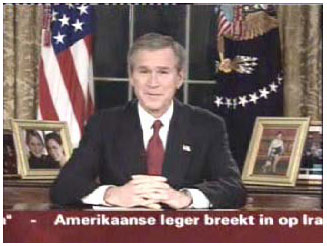
Bartlett, a 53-year-old columnist and self-described libertarian Republican who has lately been a champion for traditional Republicans concerned about Bush's governance,
went on to say: ''This is why George W. Bush is so clear-eyed about Al Qaeda and the Islamic fundamentalist enemy. He believes you have to kill them all. They can't be persuaded, that they're extremists, driven by a dark vision. He understands them, because he's just like them. . . .
This is why he dispenses with people who confront him with inconvenient facts,'' Bartlett went on to say. ''He truly believes he's on a mission from God. Absolute faith like that overwhelms a need for analysis.
The whole thing about faith is to believe things for which there is no empirical evidence.'' Bartlett paused, then said, ''But you can't run the world on faith.''
[... ...]
... policies that often seemed to collide with accepted facts. The president would say that he relied on his ''gut'' or his ''instinct'' to guide the ship of state, and then he ''prayed over it.''
The old pro Bartlett, a deliberative, fact-based wonk, is finally hearing a tune that has been hummed quietly by evangelicals (so as not to trouble the secular) for years as they gazed upon President George W. Bush.
This evangelical group -- the core of the energetic ''base'' that may well usher Bush to victory -- believes that their leader is a messenger from God.

And in the first presidential debate, many Americans heard the discursive John Kerry succinctly raise, for the first time, the issue of Bush's certainty -- the issue being, as Kerry put it, that ''you can be certain and be wrong.''
What underlies Bush's certainty? And can it be assessed
in the temporal realm of informed consent?
All of this -- the ''gut'' and ''instincts,'' the certainty and religiosity
-connects to a single word, ''faith,'' and faith asserts its hold ever more on debates in this country and abroad.
That a deep Christian faith illuminated the personal journey of George W. Bush is common knowledge.
But faith has also shaped his presidency in profound, nonreligious ways. The president has demanded unquestioning faith from his followers, his staff, his senior aides and his kindred in the Republican Party. Once he makes a decision -- often swiftly, based on a creed or moral position -- he expects complete faith in its rightness.
The disdainful smirks and grimaces that many viewers were surprised to see in the first presidential debate are familiar expressions to those in the administration or in Congress who have simply asked the president to explain his positions.
Since 9/11, those requests have grown scarce; Bush's intolerance of doubters has, if anything, increased, and few dare to question him now. A writ of infallibility -- a premise beneath the powerful Bushian certainty that has, in many ways, moved mountains -- is not just for public consumption: it has guided the inner life of the White House.
[... ...]
The faith-based presidency is a with-us-or-against-us model that has been enormously effective at, among other things, keeping the workings and temperament of the Bush White House a kind of state secret. ... ...
... ... When I quoted O'Neill saying that Bush was like ''a blind man in a room full of deaf people,'' this did not endear me to the White House. But my phone did begin to ring, with Democrats and Republicans calling with similar impressions and anecdotes about Bush's faith and certainty. These are among the sources I relied upon for this article.
Few were willing to talk on the record. Some were willing to talk because they said they thought George W. Bush might lose; others, out of fear of what might transpire if he wins.
In either case, there seems to be a growing silence fatigue -- public servants,
some with vast experience,who feel they have spent years being treated like Victorian-era children, seen but not heard, and are tired of it.
... ... Some officials, elected or otherwise, with whom I have spoken with left meetings in the Oval Office concerned that the president was struggling with the demands of the job.
Others focused on Bush's substantial interpersonal gifts as a compensation for his perceived lack of broader capabilities.
Still others, like Senator Carl Levin of Michigan, a Democrat, are worried about something other than his native intelligence. ''He's plenty smart enough to do the job,'' Levin said. ''It's his lack of curiosity about complex issues which troubles me.'' But more than anything else, I heard expressions of awe at the president's preternatural certainty and wonderment about its source.
There is one story about Bush's particular brand of certainty I am able to piece together and tell for the record.
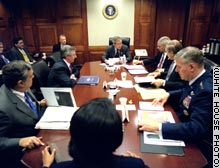
In the Oval Office in December 2002, the president met with a few ranking senators and members of the House, both Republicans and Democrats. In those days, there were high hopes that the United States-sponsored ''road map'' for the Israelis and Palestinians would be a pathway to peace, and the discussion that wintry day was, in part, about countries providing peacekeeping forces in the region.
The problem, everyone agreed, was that a number of European countries, like France and Germany, had armies that were not trusted by either the Israelis or Palestinians.
One congressman -- the Hungarian-born Tom Lantos, a Democrat from California and the only Holocaust survivor in Congress -- mentioned that the Scandinavian countries were viewed more positively. Lantos went on to describe for the president how the Swedish Army might be an ideal candidate to anchor a small peacekeeping force on the West Bank and the Gaza Strip.
Sweden has a well-trained force of about 25,000.The president looked at him appraisingly, several people in the room recall. ''I don't know why you're talking about Sweden,''
Bush said. ''They're the neutral one. They don't have an army.''Lantos paused, a little shocked, and offered a gentlemanly reply: ''Mr.
President, you may have thought that I said Switzerland. They're the ones that are historically neutral, without an army.'' Then Lantos mentioned, in a gracious aside, that the Swiss do have a tough national guard to protect the country in the event of invasion.Bush held to his view. ''No, no, it's Sweden that has no army.''
The room went silent, until someone changed the subject.
A few weeks later, members of Congress and their spouses gathered with administration officials and other dignitaries for the White House Christmas party.
The president saw Lantos and grabbed him by the shoulder. ''You were right,'' he said, with bonhomie. ''Sweden does have an army.''
This story was told to me by one of the senators in the Oval Office that December day, Joe Biden.
Lantos, a liberal Democrat, would not comment about it. In general, people who meet with Bush will not discuss their encounters. (Lantos, through a spokesman, says it is a longstanding policy of his not to discuss Oval Office meetings.)
... ...
In the summer of 2002, after I had written an article in Esquire that the White House didn't like about Bush's former communications director, Karen Hughes, I had a meeting with a senior adviser to Bush. He expressed the White House's displeasure, and then he told me something that at the time I didn't fully comprehend -- but which I now believe gets to the very heart of the Bush presidency.
The aide said that guys like me were ''in what we call the reality-based community,''
which-- he defined as people who ''believe that solutions emerge from your judicious study of discernible reality.''
I nodded and murmured something about enlightenment principles and empiricism.
He cut me off. ''That's not the way the world really works anymore,'' he continued. ''We're an empire now, and when we act, we
create our own reality. And while you're studying that reality --
judiciously, as you will -- we'll act again, creating other new realities, which you can study too, and that's how things will sort out.We're history's actors . . . and you, all of you, will be left to just
study what we do.''
Who besides guys like me are part of the reality-based community? Many of the other elected officials in Washington, it would seem.
A group of Democratic and Republican members of Congress were called in to discuss Iraq-- sometime before the October 2002 vote authorizing Bush to move forward.
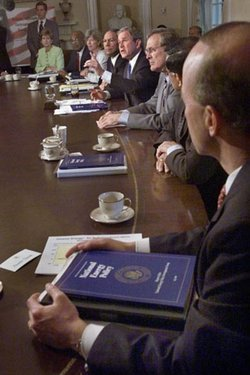
A Republican senator recently told Time Magazine that the president walked in and said: ''Look, I want your vote. I'm not going to debate it with you.'' When one of the senators began to ask a question, Bush snapped, ''Look, I'm not going to debate it with you.''
The 9/11 commission did not directly address the question of whether Bush exerted influence over the intelligence community about the existence of weapons of mass destruction. That question will be investigated after the election, but if no tangible evidence of undue pressure is found, few officials or alumni of the administration whom I spoke to are likely to be surprised.
''If you operate in a certain way -- by saying this is how I want to justify what I've already decided to do, and I don't care how you pull it off -- you guarantee that you'll get faulty, one-sided information,'' Paul O'Neill, who was asked to resign his post of treasury secretary in December 2002, said when we had dinner a few weeks ago. ''You don't have to issue an edict, or twist arms, or be overt.''
In a way, the president got what he wanted:
--a National Intelligence Estimate on W.M.D. that creatively marshaled a few thin facts, and then Colin Powell putting his credibility on the line at the United Nations in a show of faith.
That was enough for George W. Bush to press forward and invade Iraq.
As he told his quasi-memoirist, Bob Woodward, in ''Plan of Attack'': ''Going into this period, I was praying for strength to do the Lord's will. . . . I'm surely not going to justify the war based upon God. Understand that. Nevertheless, in my case, I pray to be as good a messenger of his will as possible.''
Machiavelli's oft-cited line about the adequacy of the perception of power prompts a question. Is the appearance of confidence as important as its possession? Can confidence -- true confidence -- be willed? Or must it be earned?
George W. Bush, clearly, is one of history's great confidence men.
That is not meant in the huckster's sense, though many critics claim that on the war in Iraq, the economy and a few other matters he has engaged in some manner of bait-and-switch.
No, I mean it in the sense that he's a believer in the power of confidence. At a time when constituents are uneasy and enemies are probing for weaknesses, he clearly feels that unflinching confidence has an almost mystical power. It can all but create reality.
Whether you can run the world on faith, it's clear you can run one hell of a campaign on it.
[... ...]
A recent Gallup Poll noted that 42 percent of Americans identify themselves as evangelical or ''born again.''
While this group leans Republican, it includes black urban churches and is far from monolithic. But Bush clearly draws his most ardent supporters and tireless workers from this group, many from a healthy subset of approximately four million evangelicals who didn't vote in 2000 -- potential new arrivals to the voting booth who could tip a close election or push a tight contest toward a rout.
This signaling system -- forceful, national, varied, yet clean of the
president's specific fingerprint -- carries enormous weight.
Lincoln Chafee, the moderate Republican senator from Rhode Island, has broken with the president precisely over concerns about the nature of Bush's certainty. ''This issue,'' he says, of Bush's ''announcing that 'I carry the word of God' is the key to the election. The president wants to signal to the base with that message, but in the swing states he does not.''
Come to the hustings on Labor Day and meet
the base.
In 2004, you know a candidate by his base,
and
the Bush campaign is harnessing the might of churches, with hordes
of voters
registering through church-sponsored programs.
Following the news
of Bush on his national tour in the week after
the Republican convention, you
could sense how a faith-based president
campaigns: on a surf of prayer and
righteous rage.
Righteous rage -- that's what Hardy Billington felt when he heard about same-sex marriage possibly being made legal in Massachusetts. ''It made me upset and disgusted, things going on in Massachusetts,'' the 52-year-old from Poplar Bluff, Mo., told me. ''I prayed, then I got to work.''
Billington spent $830 in early July to put up a billboard on the edge of town. It read: ''I Support President Bush and the Men and Women Fighting for Our Country. We Invite President Bush to Visit Poplar Bluff.'' Soon Billington and his friend David Hahn, a fundamentalist preacher, started a petition drive. They gathered 10,000 signatures. That fact eventually reached the White House scheduling office.
By late afternoon on a cloudy Labor Day, with a crowd of more than 20,000 assembled in a public park, Billington stepped to the podium. ''The largest group I ever talked to I think was seven people, and I'm not much of a talker,'' Billington, a shy man with three kids and a couple of dozen rental properties that he owns, told me several days later. ''I've never been so frightened.''
But Billington said he ''looked to God'' and said what was in his heart.
''The United States is the greatest country in the world,'' he told
the rally. ''President Bush is the greatest president I have ever known.
I love my president.
I love my country.
And more important, I love Jesus Christ.''
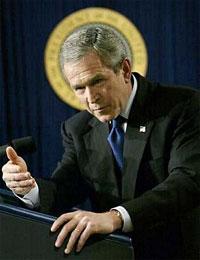
The crowd went wild, and they went wild again when the president finally arrived and gave his stump speech. There were Bush's periodic stumbles and gaffes, but for the followers of the faith-based president, that was just fine. They got it -- and ''it'' was the faith.
And for those who don't get it?
That was explained to me in late 2002 by Mark McKinnon, a longtime senior media adviser to Bush, who now runs his own consulting firm and helps the president.
He started by challenging me. ''You think he's an idiot, don't you?'' I said, no, I didn't. ''No, you do, all of you do, up and down the West Coast, the East Coast, a few blocks in southern Manhattan called Wall Street.
"Let me clue you in. We don't care. You see, you're outnumbered 2 to 1 by folks in the big, wide middle of America, busy working people who don't read The New York Times or Washington Post or The L.A. Times.
"And you know what they like? They like the way he walks and the way he points, the way he exudes confidence. They have faith in him. And when you attack him for his malaprops, his jumbled syntax, it's good for us.
"Because you know what those folks don't like? They don't like you!''
In this instance, the final ''you,'' of course, meant the entire reality-based community.
Thee bond between Bush and his base is a bond of mutual support.
He supports them with his actions, doing his level best to stand firm on wedge issues like abortion and same-sex marriage while he identifies evil in the world, at home and abroad.
They respond with fierce faith. The power of this transaction is something that people, especially those who are religious, tend to connect to their own lives.
If you have faith in someone, that person is filled like a vessel. Your faith is the wind beneath his or her wings. That person may well rise to the occasion and surprise you: I had faith in you, and my faith was rewarded. Or, I know you've been struggling, and I need to pray harder.
Bush's speech that day in Poplar Bluff finished with a mythic appeal: ''For all Americans, these years in our history will always stand apart,'' he said. ''You know, there are quiet times in the life of a nation when little is expected of its leaders.
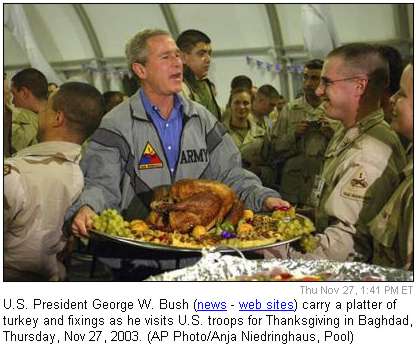
This isn't one of those times. This is a time that needs -- when we need firm resolve and clear vision and a deep faith in the values that make us a great nation.''
The life of the nation and the life of Bush effortlessly merge -- his fortitude, even in the face of doubters, is that of the nation; his ordinariness, like theirs, is heroic; his resolve, to whatever end, will turn the wheel of history.
Remember, this is consent, informed by the heart and by the spirit. In the end, Bush doesn't have to say he's ordained by God. After a day of speeches by Hardy Billington and others, it goes without saying.
''To me, I just believe God controls everything, and God uses the president to keep evil down, to see the darkness and protect this nation,'' Billington told me, voicing an idea shared by millions of Bush supporters.
''Other people will not protect us. God gives people choices to make. God gave us this president to be the man to protect the nation at this time.''
But when the moment came in the V.I.P. tent to shake Bush's hand, Billington remembered being reserved. '''I really thank God that you're the president' was all I told him.'' Bush, he recalled, said, ''Thank you.''
''He knew what I meant,'' Billington said. ''I believe he's an instrument of God, but I have to be careful about what I say, you know, in public.''
Is there anyone in America who feels that John Kerry is an instrument of God?
''I'm going to be real positive, while I keep my foot on John Kerry's throat,'' George W. Bush said last month at a confidential luncheon a block away from the White House with a hundred or so of his most ardent, longtime supporters, the so-called R.N.C. Regents.
This was a high-rolling crowd -- at one time or another, they had all given large contributions to Bush or the Republican National Committee. Bush had known many of them for years, and a number of them had visited him at the ranch. It was a long way from Poplar Bluff.
The Bush these supporters heard was a triumphal Bush, actively beginning to plan his second term. It is a second term, should it come to pass, that will alter American life in many ways, if predictions that Bush voiced at the luncheon come true. ... ...
According to notes provided to me, and according to several guests at the lunch who agreed to speak about what they heard, he said that ''Osama bin Laden would like to overthrow the Saudis . . .
then we're in trouble. Because they have a weapon. They have the oil.''
He said that there will be an opportunity to appoint a Supreme Court justice shortly after his inauguration, and perhaps three more high-court vacancies during his second term.
''Won't that be amazing?'' said Peter Stent, a rancher and conservationist who attended the luncheon. ''Can you imagine? Four appointments!''
After his remarks, Bush opened it up for questions, and someone asked what he's going to do about energy policy with worldwide oil reserves predicted to peak.
Bush said: ''I'm going to push nuclear energy, drilling in Alaska and clean coal. Some nuclear-fusion technologies are interesting.'' He mentions energy from ''processing corn.''
''I'm going to bring all this up in the debate, and I'm going to push it,'' he said, and then tried out a line. ''Do you realize that ANWR [the Arctic National Wildlife Refuge] is the size of South Carolina, and where we want to drill is the size of the Columbia airport?''
The questions came from many directions -- respectful, but clearly reality-based.
About the deficits, he said he'd ''spend whatever it takes to protect our kids in Iraq,'' that ''homeland security cost more than I originally thought.''
In response to a question, he talked about diversity, saying that ''hands down,'' he has the most diverse senior staff in terms of both gender and race. He recalled a meeting with Chancellor Gerhard Schröder of Germany. ''You know, I'm sitting there with Schröder one day with Colin and Condi. And I'm thinking: What's Schröder thinking?! He's sitting here with two blacks and one's a woman.''
But as the hour passed, Bush kept coming back to the thing most on his mind: his second term.
''I'm going to come out strong after my swearing in,'' Bush said, ''with fundamental tax reform, tort reform, privatizing of Social Security.''
The victories he expects in November, he said, will give us ''two years, at least, until the next midterm. We have to move quickly, because after that I'll be quacking like a duck.''
... A regent I spoke to later and who asked not to be identified told me: ''I'm happy he's certain of victory and that he's ready to burst forth into his second term, but it all makes me a little nervous.
There are a lot of big things that he's planning to do domestically, and who knows what countries we might invade or what might happen in Iraq.
But when it gets complex, he seems to turn to prayer or God rather than digging in and thinking things through.
What's that line? -- the devil's in the details. If you don't go after that devil, he'll come after you.''
Bush grew into one of history's most forceful leaders, his admirers will attest, by replacing hesitation and reasonable doubt with faith and clarity. Many more will surely tap this high-voltage connection of fervent faith and bold action. In politics, the saying goes, anything that works must be repeated until it is replaced by something better. The horizon seems clear of competitors.
... is what Jim Wallis wishes he could sit and talk about with George W. Bush. That's impossible now, he says. He is no longer invited to the White House.
''Faith can cut in so many ways,'' he said. ''If you're penitent and not triumphal, it can move us to repentance and accountability and help us reach for something higher than ourselves. That can be a powerful thing, a thing that moves us beyond politics as usual, like Martin Luther King did.
But when it's designed to certify our righteousness -- that can be a dangerous thing.
"Then it pushes self-criticism aside. There's no reflection.
''Where people often get lost is on this very point,'' he said after a moment of thought. ''Real faith, you see, leads us to deeper reflection and not -- not ever -- to the thing we as humans so very much want.''
And what is that?
''Easy certainty.''
To Help All Indians Make Up Their Minds About US Elections:
Bollywood goes to Washington: Heinz Catsup / Saudi Arabia --Presidential Debate, 2004
Badmash.org, October 8, 2004
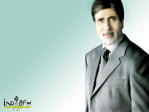
Amitabh Bacchan Presents: Who Wants Some Dishoom? (flash w/sound)
The World Backs Kerry
Editorial, The Guardian, October 15, 2004
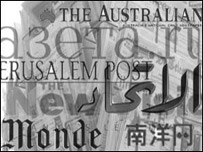
Millions of Americans are scratching their heads over how to vote on November 2 after the last of the three televised presidential debates left George Bush and John Kerry neck and neck over jobs, education, health care and taxes, with little mention of Iraq or 9/11.
But the rest of the world, according to a poll we and several other newspapers publish today, has already made up its mind, backing the Democratic challenger by a margin of two to one.
Any sample, of course, is just a sample, but this survey of public opinion in 10 countries does include the US's two immediate neighbours, Canada and Mexico, as well as Israel and Russia, Washington's close allies in the "war on terror", and Britain, still its most loyal transatlantic friend, despite widespread criticism of Tony Blair.
Unfortunately, Muslim countries are absent, though their inclusion would have made even gloomier reading for the White House. A recent Pew Research Centre poll, for example, showed just 7% of Pakistanis approve of Mr Bush, while 65% have a favourable opinion of Osama bin Laden.
These findings - likely to achieve a high degree of exposure because they are media-driven - confirm previous polls in underlining the degree of global hostility to President Bush and the Iraq war.
Some 74% of Germans, according to GlobeScan, want to see Mr Kerry win the election. A June poll conducted by the German Marshall Fund found that 76% of respondents in nine European countries disapproved of Mr Bush's handling of international affairs, up significantly from a survey in 2002. It also found that 80% of Europeans polled - compared with half of Americans - said Iraq was not worth the human and financial cost.
In Europe, only Poles would rather see Mr Bush back in the Oval office. Elsewhere in "new Europe" there is a distinctly "old European" wish to see the Massachusetts senator win.
Further afield, Israelis are the only people to back the incumbent and to see American democracy as a model for other countries. Similarly positive views in Russia appear to reflect the hardline US view on Chechen terrorism: the survey was carried out in the aftermath of the Beslan school massacre. [...more]
Election diary:
Tom Carver, The Independent, 17 October 2004
After Wednesday's debate, a Republican journalist confided to me that he thought Kerry was going to win the election. To my surprise, he didn't seem upset by the idea.
"A lot of Republicans would like to see the smile wiped off Karl Rove's face," he confessed.
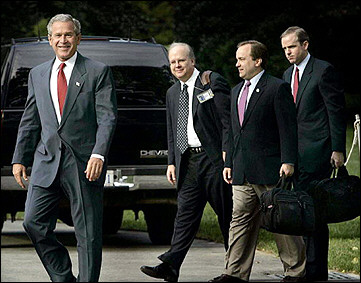
The smugness in this White House has irritated many Republicans for a long time, but before this week they would not have dared to express their irritation out loud. However, a lot of Bush people now seem to feel that they could sleep at night if Kerry became President.
An indicator that the Bush camp is worried: Rove, Karen Hughes and others are suddenly willing to talk to journalists. In the past few days they have been making regular forays into the centre for the travelling band of national newspaper and network press, a group they usually scorn in favour of the more malleable local media on the road.
I asked Karen Hughes this week how the President could get re-elected with an approval rating under 50 per cent. "These polls go up and go down," she said. "The only poll I believe in is the one on 2 November." That's the kind of thing spinners say when they have no more bullets left.
• The record voter-registration levels being recorded by most states is playing havoc with the opinion polls. People who have just registered are not on the lists of registered voters that the polling companies use to call people to find out who they're supporting. So the result on 2 November could be as much as five or six points out - in either direction. The Democrats believe that a higher turnout helps them more, because the politically apathetic are more likely to vote out an incumbent in a poor economy and because the apathetic are often the poor who favour Democrats. Mike McCurry, one of Kerry's savviest political operatives, claimed to me this week that 180,000 more Democrats than Republicans had registered in Cleveland, Ohio - enough to deliver the state. [...more]

